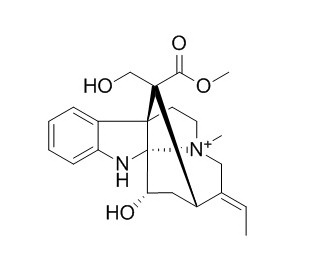Echitamine
Echitamine chloride possesses anti-tumour activity in-vitro and in-vivo.
Inquire / Order:
manager@chemfaces.com
Technical Inquiries:
service@chemfaces.com
Tel:
+86-27-84237783
Fax:
+86-27-84254680
Address:
1 Building, No. 83, CheCheng Rd., Wuhan Economic and Technological Development Zone, Wuhan, Hubei 430056, PRC
Providing storage is as stated on the product vial and the vial is kept tightly sealed, the product can be stored for up to
24 months(2-8C).
Wherever possible, you should prepare and use solutions on the same day. However, if you need to make up stock solutions in advance, we recommend that you store the solution as aliquots in tightly sealed vials at -20C. Generally, these will be useable for up to two weeks. Before use, and prior to opening the vial we recommend that you allow your product to equilibrate to room temperature for at least 1 hour.
Need more advice on solubility, usage and handling? Please email to: service@chemfaces.com
The packaging of the product may have turned upside down during transportation, resulting in the natural compounds adhering to the neck or cap of the vial. take the vial out of its packaging and gently shake to let the compounds fall to the bottom of the vial. for liquid products, centrifuge at 200-500 RPM to gather the liquid at the bottom of the vial. try to avoid loss or contamination during handling.
The Korea Journal of Herbology2016, 29-35
Neurochem Int.2018, 121:114-124
Molecules.2023, 28(5):2376.
Pharm Biol.2022, 60(1):2040-2048.
Int Immunopharmacol.2020, 90:107268.
J Cell Mol Med.2022, 26(23):5807-5819.
Mol Pharm.2017, 14(9):3164-3177
Nutrients.2022, 14(19):4170.
Appl Biol Chem2019, 62:46
Molecules.2024, 29(23):5792.
Related and Featured Products
J Pharm Pharmacol. 2005 Sep;57(9):1213-9.
Evaluation of the cytotoxic effect of the monoterpene indole alkaloid echitamine in-vitro and in tumour-bearing mice.[Pubmed:
16105243]
The cytotoxic effect of various concentrations of Echitamine chloride was studied in HeLa, HepG2, HL60, KB and MCF-7 cell lines in-vitro and in mice bearing Ehrlich ascites carcinoma (EAC).
METHODS AND RESULTS:
Exposure of various cells to different concentrations of Echitamine chloride resulted in a concentration-dependent cell killing, and KB cells were found to be most sensitive amongst all the cells evaluated. EAC mice treated with 1, 2, 4, 6, 8, 12 or 16 mg kg-1 Echitamine chloride showed a dose-dependent elevation in the anti-tumour activity, as evident by increased number of survivors in comparison with the non-drug treated controls. The highest dose of Echitamine chloride (16 mg kg-1) caused toxicity in the recipient mice, therefore 12 mg kg-1 was considered the best cytotoxic dose for its anti-tumour effect. Administration of 12 mg kg-1 Echitamine chloride resulted in an increase in the median survival time (MST) up to 30.5 days, which was 11.5 days higher than the non-drug treated control (19 days). Administration of 16 mg kg-1 Echitamine chloride to EAC mice resulted in a time dependent elevation in lipid peroxidation that reached a peak at 6 h post-treatment, whereas glutathione concentration declined in a time dependent manner and a maximum decline was reported at 3 h post-treatment.
CONCLUSIONS:
Our study demonstrated that Echitamine chloride possessed anti-tumour activity in-vitro and in-vivo.



